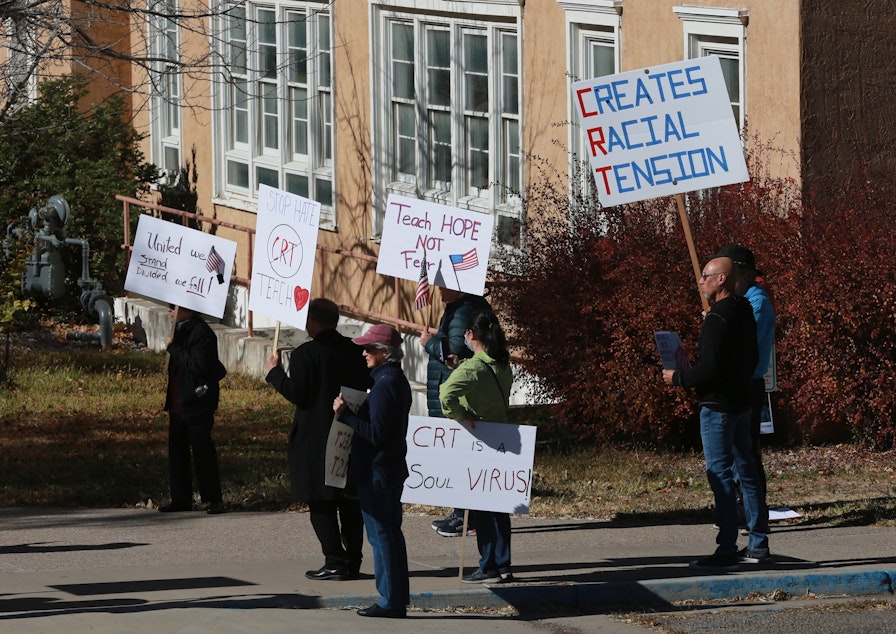Trump has vowed to end DEI. But in the Seattle area, that work was already dwindling

President Donald Trump has vowed to end federal diversity, equity, and inclusion programs, arguing they're "illegal." But in the Seattle area, one DEI consultant says the field was already changing prior to Trump retaking office.
2020 saw a torrent of institutions publicly committing — verbally and financially — to DEI initiatives amid widespread racial justice protests. Those pledges seemed particularly fortified in Seattle, a city with a reputation for being a leader in DEI work.
“After George Floyd, there was a spike in the amount of [DEI] opportunities that were available,” said independent consultant Alma Villegas.
RELATED: Trump calls DEI programs 'illegal.' He plans to end them in the federal government
Since 2015, Villegas has worked with private companies and local governments to help make their organizations more diverse and equitable. But in recent months, the appetite for that work has shrunken.
Sponsored
A growing list of companies including Amazon, Meta, and Target have recently rolled back their DEI initiatives.
"You get a group of people and they’re uncomfortable or they’re afraid — and you have that in the majority — they’re going to make a decision to rescind or go backwards,” Villegas said.
Some companies, however, are doubling down on their commitments to DEI. Shareholders of Issaquah-based Costco voted last week against a proposal to investigate the company’s DEI policies.
Meanwhile, 19 Republican state attorneys general have signed a letter demanding that the company end all “illegal and discriminatory” DEI policies.
RELATED: Costco shareholders reject proposal to investigate the company's DEI policies
Sponsored
Locally, Villegas said there's been a dip in the demand for DEI consulting since last summer.
“We started seeing...less opportunities that really mentioned DEI [and] we started seeing a change in the language,” she said.
As the number of potential contracts slimmed down, competition stiffened. Villegas suddenly found herself competing with companies from all over the country for local work.
“We ended up getting outbid, or second or third place, whereas in the past, we were a shoo-in to get the contract because it was really specific to our work,” she said.
Those changes have impacted Villegas’ business projections and income. In years past, Villegas was able to get a sense of her average income and work priorities a year in advance — sometimes even two.
Sponsored
“This year, I am nowhere near that,” Villegas said. “I’m at about 50%, and that’s really only through the first six months of the year.”
In August, Villegas met with a colleague to go over the direction of their firm.
“We essentially redefined our services," she said. "I did some updates to the website and started promoting more, just to try and see if we can generate more work because we’re not where we need to be this year."
On the firm’s homepage, you won’t see the acronym "DEI," but you will see words like “racial equity” and “belonging." And although the acronym of "DEI" is becoming increasingly controversial, barring any threats of DEI being outlawing altogether, Villegas said she's not backing down from the core values of her work.
“Racial equity was really the foundation of why I became a consultant, and the people I work with feel very strongly the same way,” Villegas said. “We said, ‘No, we’re not going to be essentially bullied into changing who we are.’”
Sponsored
While Villegas said Trump's executive order won’t end her work, she thinks the future of DEI will be different.
Going forward, "it has to be more individual-based," she said. "It’s going to be something that is optional for the people who are willing to make the change. And hopefully we’re working with companies or teams where you have the majority of the folks who are willing to do that.”
When prospective clients approach her, Villegas said she'll be "very" transparent about her approach to racial equity, and will ask them about their intentions.
“I’m not saying I’m going to turn work down. I’m just saying I’m going into situations with a very, very clear understanding of where they are,” she said.
“For now, I’m just going to continue to do the work and be true to who I am, and advocate and fight for my community.”


